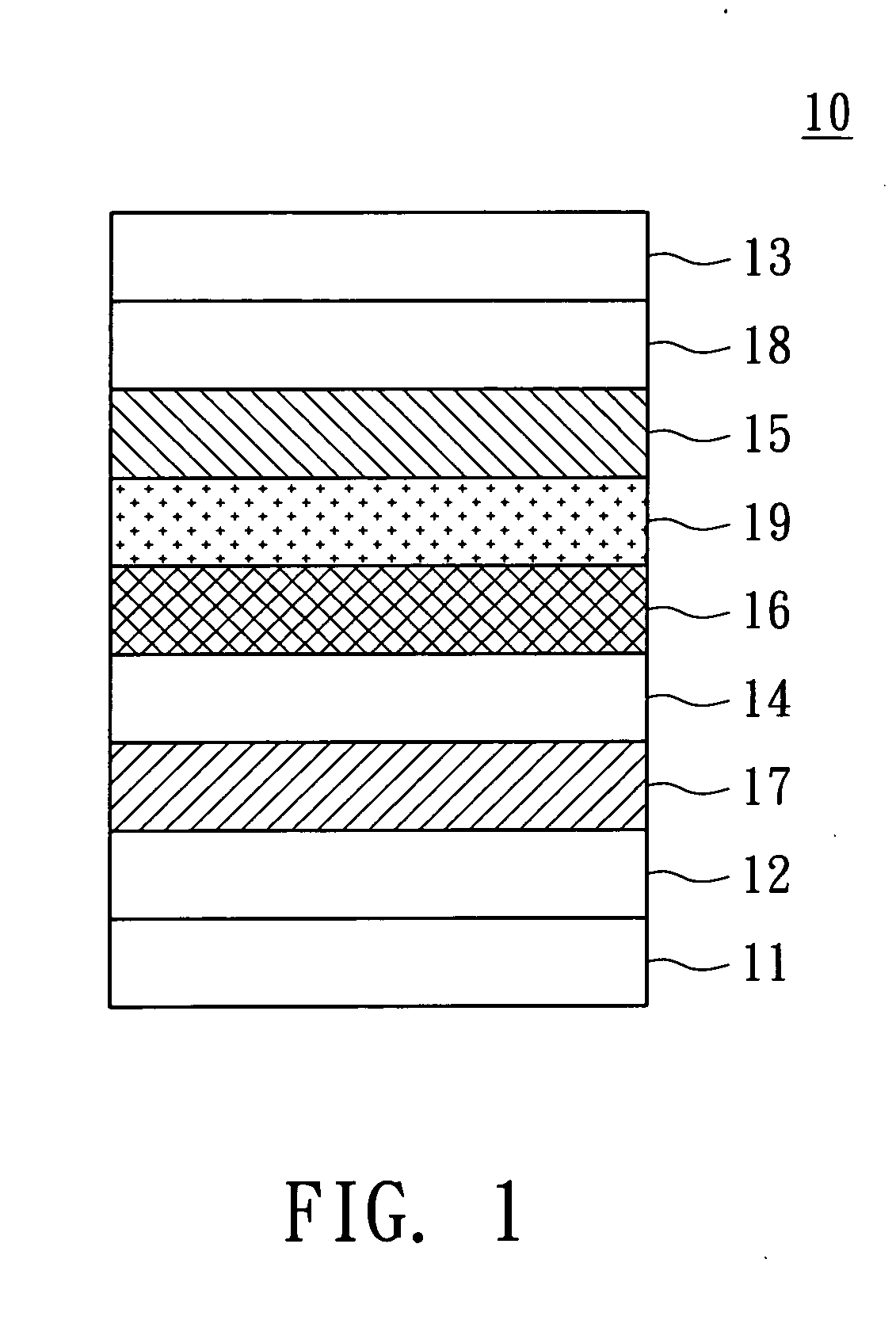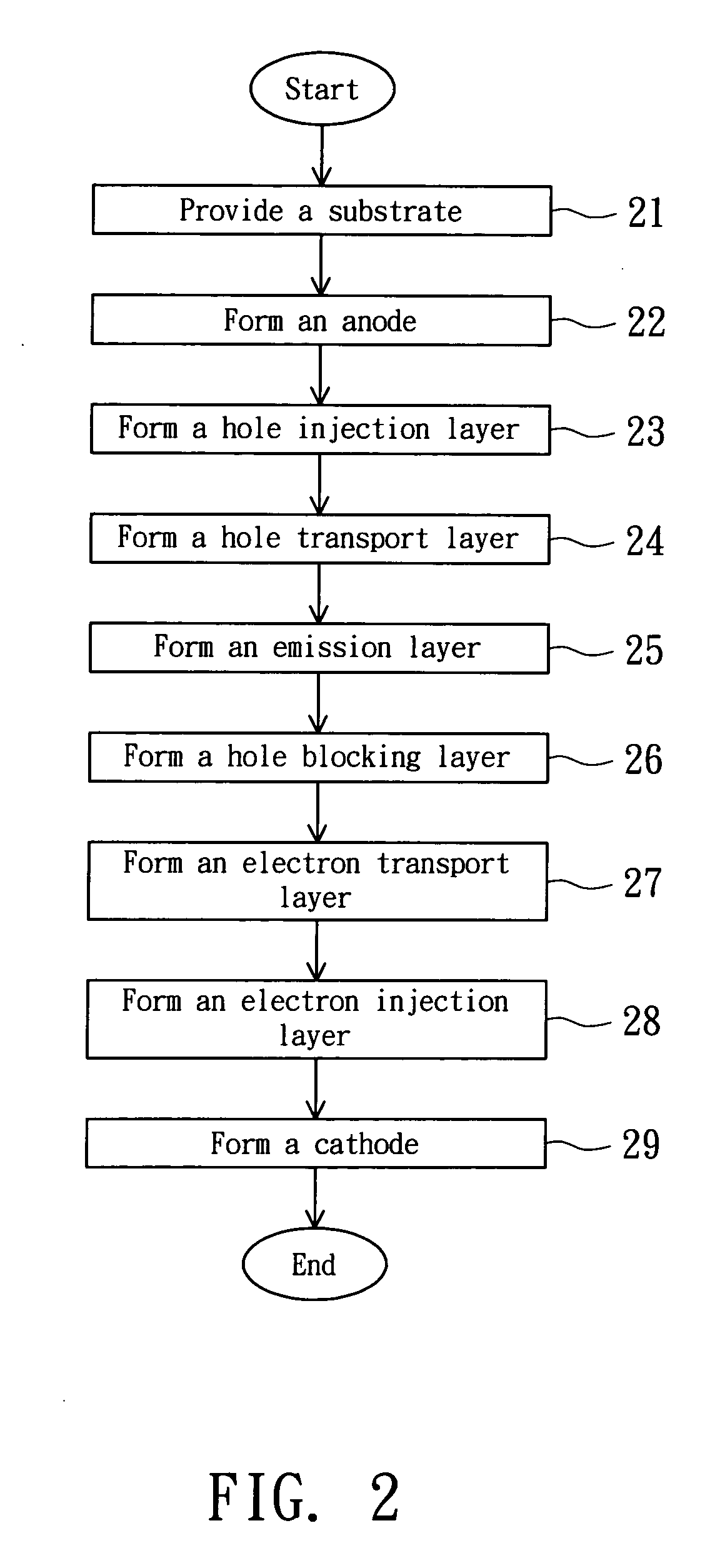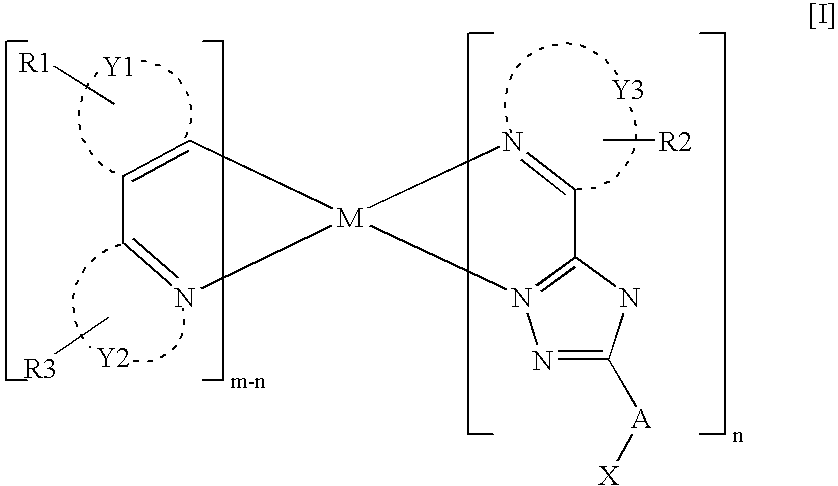Light emission material and organic electroluminescent device using the same
- Summary
- Abstract
- Description
- Claims
- Application Information
AI Technical Summary
Benefits of technology
Problems solved by technology
Method used
Image
Examples
first embodiment
[0018] The invention provides an emission material having the features of easy sublimation, quick response and high output rate, therefore requires a shorter purification time than conventional Flrpic blue phosphorescent material. Compared with the conventional device using the Flrpic blue phosphorescent material, the device using the emission material of the invention obtains higher luminous efficiency and lower CIE value and has a bluer photochromism. The emission material of the invention is represented by chemical formula [I]:
[0019]“M” represents a metal atom whose atomic weight is greater than 40. m is smaller than or equal to the ligand number of “M”. n is a positive integral and is smaller than m. “Y1” is selected from aryl or heteroaryl. “Y2” and “Y3” are respectively selected from nitro-containing heterocyclic ring. “X”, “R1”, “R2” and “R3” are respectively selected from any substituent group or hydrogen. “A” is selected from aryl, heteroaryl or nitro-containing heterocyc...
second embodiment
[0054] Referring to FIG. 1, a structural diagram of an OLED according to a second embodiment of the invention is shown. In the embodiment, the OELD, including organic light emitting diode (OLED) of small molecules and polymer light emitting diode (PLED), is exemplified by the OLED here. However, the technology disclosed in the embodiment is applicable to the PLED.
[0055] In FIG. 1, the OELD 10 includes a substrate 11, an anode 12, a cathode 13, a hole transport layer 14, an electron transport layer 15 and an emission layer 16. The anode 12 and the cathode 13 are disposed on the substrate 11. The hole transport layer 14 is disposed between the anode 12 and the cathode 13. The electron transport layer 15 is disposed between the hole transport layer 14 and the cathode 13. The emission layer 16 is disposed between the hole transport layer 14 and the electron transport layer 15, and the emission layer 16 includes a host and a dopant. The chemical structure of the dopant is represented by...
third embodiment
[0072] Referring to FIG. 2 is a flowchart of the manufacturing method of an OLED according to a third embodiment of the invention is shown. Refer to FIG. 1 at the same time. At first, the method begins at step 21, a substrate 11 is provided. Next, proceed to step 22, an anode 12 is formed on the substrate 11. Then, proceed to step 23, a hole injection layer 17 is formed on the anode 12. Next, proceed to step 24, a hole transport layer 14 is formed on the hole injection layer 17. Then, proceed to step 25, an emission layer 16 is formed on the hole transport layer 14. The emission layer 16 has a host and a dopant. The chemical structure of the dopant is represented by formulas [I]. Next, proceed to step 26, a hole blocking layer 19 is formed on the emission layer 16. Afterwards, proceed to step 27, an electron transport layer 15 is formed on the hole blocking layer 19. Next, proceed to step 28, an electron injection layer 18 is formed on the electron transport layer 15. At last, proce...
PUM
| Property | Measurement | Unit |
|---|---|---|
| Nanoscale particle size | aaaaa | aaaaa |
| Nanoscale particle size | aaaaa | aaaaa |
| Transport properties | aaaaa | aaaaa |
Abstract
Description
Claims
Application Information
 Login to View More
Login to View More - R&D
- Intellectual Property
- Life Sciences
- Materials
- Tech Scout
- Unparalleled Data Quality
- Higher Quality Content
- 60% Fewer Hallucinations
Browse by: Latest US Patents, China's latest patents, Technical Efficacy Thesaurus, Application Domain, Technology Topic, Popular Technical Reports.
© 2025 PatSnap. All rights reserved.Legal|Privacy policy|Modern Slavery Act Transparency Statement|Sitemap|About US| Contact US: help@patsnap.com



